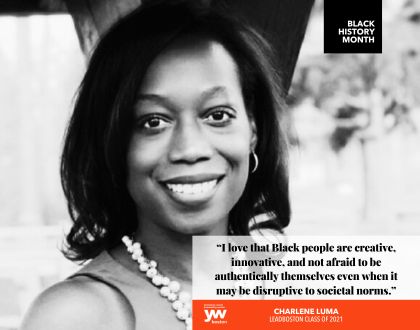
February 28, 2024
By: Ilana Coolidge
Black History Month LeadBoston Spotlight: Charlene Luma
Charlene Luma (LeadBoston Class of 2021), Chief of Staff at Suffolk County District Attorney’s Office, spoke with YW Boston about Black History Month, her career and advice for young professionals, and her experience with LeadBoston.
What does Black History mean to you?
Black History Month is about uplifting, rejoicing, and acknowledging the contributions that members of the Black community have made historically, culturally, politically, nationally, and globally. It is about not only acknowledging our existence, but our impact as well.
What personal or professional accomplishment are you most proud of?
I am most proud of my ability to lead with integrity in all the roles that I have had. I value the importance of social responsibility, and making sure that we see and hear all people including those who do not have a voice.
How has being Black shaped you? Has it had any influence on your accomplishments?
I am so proud to be not only a Black woman but a Black woman of Haitian descent. I come from a rich history of ancestors that not only fought for independence, justice, and equality, but they also fought and supported justice for others. I believe that has directly influenced how I see the world, and how I choose to lead.
What are some of the things you love most about your heritage? Or what are you most proud of regarding your heritage?
I love the diversity, authenticity, and the strength of my heritage. I love that Black people are creative, innovative, and not afraid to be authentically themselves even when it may be disruptive to societal norms.
What is a family tradition you wish to pass down to the next generation?
My family gathers for each holiday and at the center of each gathering is our Haitian food. The dishes are traditional and remind us of our rich culture.
What are your thoughts on recent efforts to reduce or remove lessons on Black history in public schools?
I believe that there is so much to learn from Black history which is an integral part of American history. It is unfortunate that there are efforts to reduce or prohibit people from learning about Black history in schools.
What advice would you give to young Black professionals who are looking to get into your field? Or, what advice would you give to your younger self?
I would say to any young person and my younger self:
“Why not you? You deserve to be here just as much as anyone else. We need you!”
What were your reasons for joining Lead Boston and what was your biggest takeaway from the program?
I wanted to strengthen my leadership skills and have the opportunity to share space with others invested in racial justice, social justice, diversity, equity, and inclusion in Boston.
How do you feel you are breaking barriers in the workplace?
I am the first Black woman in my role as Chief of Staff and I also am a licensed clinician. I have a unique perspective that I bring to this role that is grounded in all of my experiences, including that as a person of color.
What are you reading, watching, or listening to right now? Do you have any Black History Month book, documentary, or podcast recommendations?
I have made a commitment to listen to more podcasts this year. So, I am still exploring that. One of the most recent books I read was Finding Me by Viola Davis
About LeadBoston
Our signature leadership program, LeadBoston, supports all individual participants as they create and implement a leadership commitment. This leadership commitment is an action plan that confronts some of the systemic inequities they’ve learned about and that are showing up in their organization. This plan, and the collective LeadBoston experience, empowers leaders to create meaningful change in their workplaces, in their communities, and in the city of Boston itself. Staff work alongside alums for a year following the program to ensure participants have what they need to see their plan through. Click here to learn more.

